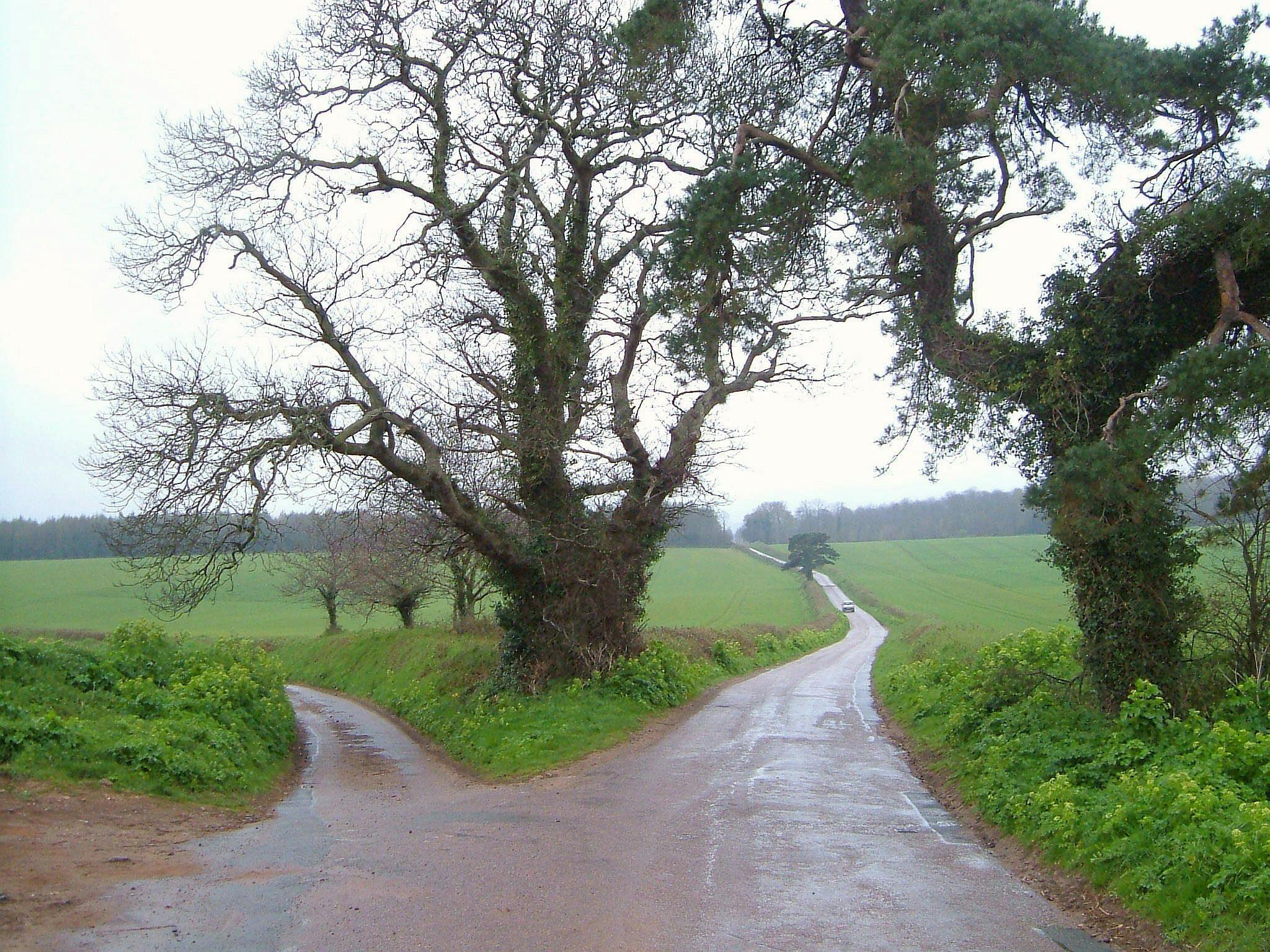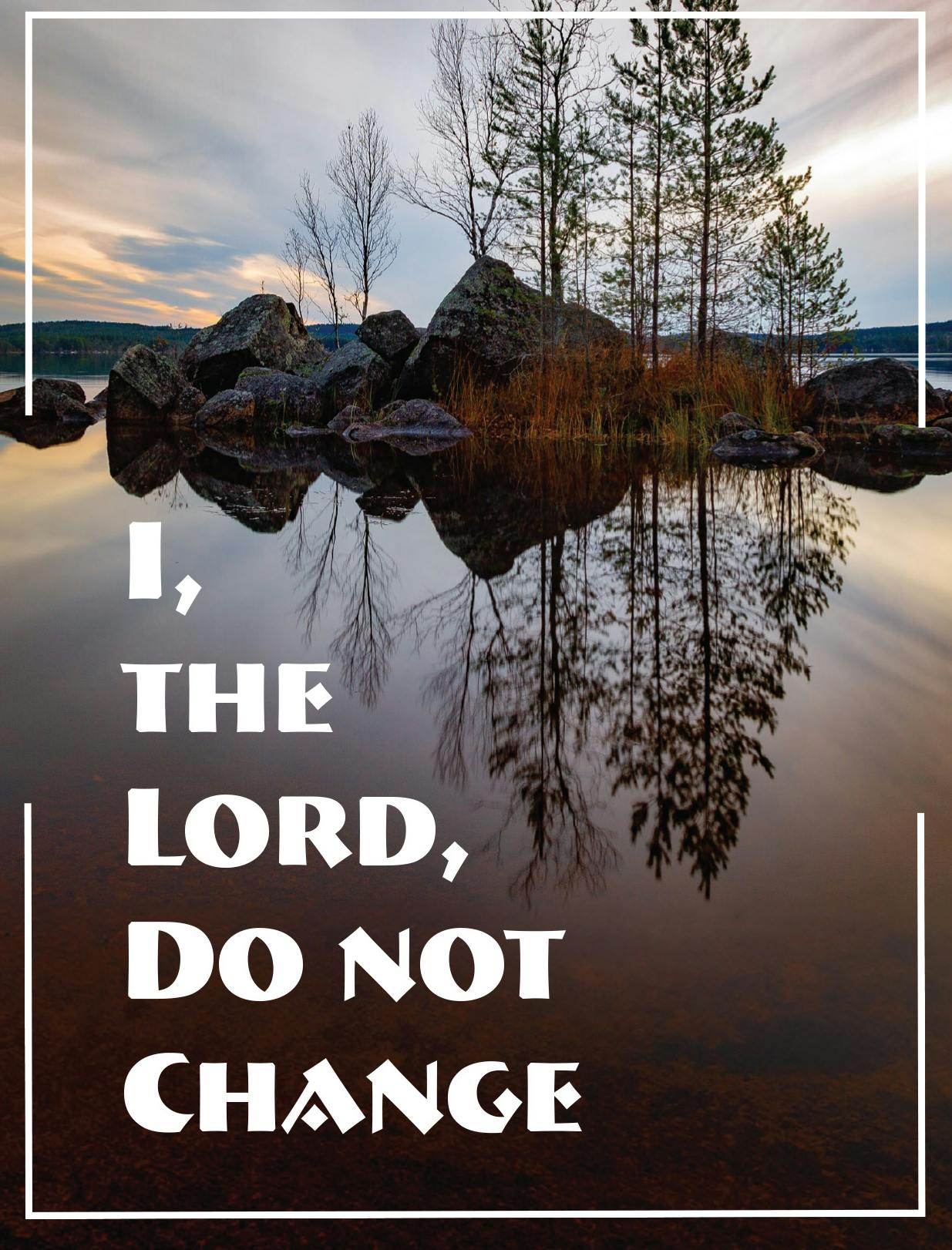The Way

Download PDF Version
“The way” is a central concept throughout Scripture. There’s the way of the Lord, the way of life or the way everlasting. God chose Abraham saying, “For I have known him, in order that he may command his children and his household after him, that they keep the way of the Lord, to do righteousness and justice, that the Lord may bring to Abraham what He has spoken to him” (Gen. 18:19). Proverbs 15:24 adds, “The way of life winds upward for the wise, that he may turn away from hell below.” David prayed in Psalm 139:23–24, “Search me, O God, and know my heart; try me, and know my anxieties; and see if there is any wicked way in me, and lead me in the way everlasting.”
I believe many today feel a sense of being lost as biblical and moral norms are stripped away. On the other hand, there is the “good way” mentioned in Jeremiah 6:16 that can center us and bring rest to our souls. “This is what the Lord says: ‘Stand by the ways and see and ask for the ancient paths, where the good way is, and walk in it; then you will find a resting place for your souls.’ But they said, ‘We will not walk in it’” (NASB).
Many Ways or One Way
Throughout the Scriptures, we see that the way of the Lord is to do righteousness and justice—to treat others as we would want them to treat us. After all, it is basic decency. God, the Sovereign Creator of the universe, gave mankind principles for how to live a good life and build strong, just societies. When we transgress these ways of common decency, our consciences naturally try to warn us. Even people who do not know God or His Word usually has a sense of what is right and wrong.
The wisest man who ever lived, King Solomon, often wrote about the way of the Lord in his proverbs. In Proverbs 16:25, he teaches, “There is a way that seems right to a man, but its end is the way of death.” The warning is clear: there is “a way” that seems right when we try to go in our own direction, but it is not “the way” of the Lord, and it ultimately leads to death.
Solomon also instructs in Proverbs 12:28, “In the way of righteousness is life, and in its pathway there is no death.” The way of the Lord is clearly the way of righteousness as God defines it in His Word. The Bible challenges us repeatedly to choose between the way of life and the way of death. The prophet Hosea asks, “Who is wise? Let him understand these things. Who is prudent? Let him know them. For the ways of the Lord are right; the righteous walk in them, but transgressors stumble in them.” (14:9) The apostle James knew this truth and reminded the Church when he wrote, “Therefore, to him who knows to do good and does not do it, to him it is sin” (4:17).
In Judaism, this concept of basic morality is known as Derech Eretz. Literally, it means “the way of the land,” which implies an ethical and responsible way to live or the common way to behave or speak.

The Way of the Lord
In Acts 18:25, we read about the ministry of Apollos in Ephesus. “This man had been instructed in the way of the Lord; and being fervent in spirit, he spoke and taught accurately the things of the Lord, though he knew only the baptism of John.” When Priscilla and Aquila heard Apollos teaching, they took him aside and explained the way of the Lord more accurately to him (verse 26). Up to that point, Apollos only knew the baptism of John, which, according to the four Gospel writers—Matthew, Mark, Luke and John—entails a ministry of repentance. All four also refer directly to a prophecy in Isaiah. Mark 1:3–4 says, “The voice of one crying in the wilderness: ‘Prepare the way of the Lord; make his paths straight.’ John came baptizing in the wilderness and preaching a baptism of repentance for the remission of sins.”
During His earthly ministry, Jesus (Yeshua) also taught about the way. In Matthew 7:13–14, He instructed, “Enter by the narrow gate; for wide is the gate and broad is the way that leads to destruction, and there are many who go in by it. Because narrow is the gate and difficult is the way which leads to life, and there are few who find it.”

The world tells us that there are many right ways. Don’t be so restricted and inhibited, they advise. Follow your own path and you will find fulfillment. But remember Proverbs 16:25 and Jeremiah 6:16, and be warned.
Even some in the Christian Church today teach that “the way of the Lord” as taught in the Old Testament is no longer necessary. This type of teaching argues that Christ, in his sacrificial death and resurrection, did away with the “Law,” which means that believers now live only by grace. Taken to the extreme, some even teach that we do not need to keep the way of the Lord; all we need is to believe in Jesus and we can live as we please.
Tragically, this vein of theology severs the connection between faith and faithfulness. Our Lord was completely righteous. And as His disciples, our lives are meant to follow His example. In his Gospel account, the apostle John quotes Jesus twice with the message that we are His disciples if we keep His commandments (8:31 and 15:14). The warning from Jeremiah 6:16 also clearly instructs us to find “where the good way is, and walk in it.” It is not enough for us to simply believe; we must also walk in this belief and live it out in our lives. Our faith, if real, must produce fruit…the fruit of growing righteousness.
The Way, The Truth and The Life
Let’s explore how Jesus’ First Century audience would likely have understood the term “the way” and what it can mean to our walk of faith today.
Jesus referred to himself when he taught about the way in John 14:6b, “I am the way, the truth, and the life. No one comes to the Father except through Me.”
Jesus’ earliest disciples referred to themselves as followers of the Way. Consider the following references from the Book of Acts, which recounts the earliest years of what later became known as Christianity.
In Acts 9:2, Saul, who would later be known as Paul, asked the High Priest for “letters from him to the synagogues of Damascus, so that if he found any who were of the Way, whether men or women, he might bring them bound to Jerusalem.” Paul again witnesses to the persecution of followers of the Way in Acts 22:4. Acts 19 offers two more references to “the Way” in verses 9 and 23. Then, in Acts 24, Paul defends himself before Felix, the Roman governor, testifying, “But this I confess to you, that according to the Way which they call a sect, so I worship the God of my fathers, believing all things which are written in the Law and in the Prophets” (v. 14).
It is crucial to note in Paul’s confession that he believes all the things that are written in the Law or the Torah (Gen.–Deut.) and the Prophets.
We read the Roman governor’s response in verse 22, “But when Felix heard these things, having more accurate knowledge of the Way, he adjourned the proceedings and said, ‘When Lysias the commander comes down, I will make a decision on your case.’”
These accounts from Acts support the fact that early believers used the designation “Followers of the Way” well before outsiders in Antioch began referring to believers as “Christians” (Acts 11:26). Christos is the Greek word for Messiah, and Christianoi (Christians) means Messiah People. At that time, Antioch was a predominantly Gentile, Roman city. Bible teacher and author David H. Stern writes in the “Jewish New Testament” that Gentile unbelievers in Antioch called Gentile followers of Jesus Christianoi because they kept hearing people refer to the leader/founder of this group as Christos (Christ or Messiah). Originally, this was most probably used as a deprecatory term. Eventually, both Jewish and Gentile believers proudly bore the name “Christian.” This is clear from 1 Peter 4:16, where the apostle admonished, “Yet if anyone suffers as a Christian, let him not be ashamed, but let him glorify God in that name.”

On an obvious level, when the early believers called themselves followers of “the Way,” they were likely referring to Jesus. But in a deeper and more broad sense, I posit that they were also identifying themselves as people who followed the God of Israel, those who walked in the “Way of the Lord.”
As Christians, we believe Jesus is the Living Word, the Torah incarnate, thus the Way. This doctrine comes primarily from the opening verses of John’s Gospel. “In the beginning was the Word, and the Word was with God, and the Word was God. He was in the beginning with God. All things were made through him, and without him was not any thing made that was made. In him was life, and the life was the light of men” (1:1–4).
Not A New Way
“The Way” was not considered a new religion, but was first understood as a reform movement within Judaism, thus a sect (see Acts 24:14). The earliest believers were Jewish people with a thoroughly Hebraic (biblical) worldview. When Jesus’ Jewish audience heard him refer to himself as “the way, the truth, and the life,” (John 14:6), I believe they would have understood this as a reference to God’s word, the Hebrew Scriptures.
It is a foundational belief in Judaism that the Torah is life. This is understood from passages like Deuteronomy 32:46–47, where Moses warned, “For it is no empty word for you, but your very life.” In John 17:17, Jesus proclaimed while praying to the Father, “Your word is truth.” From a Hebraic understanding, the way, the truth and the life thus refers to God’s living Word, the Bible. He gave it to mankind to teach us His way to live in right relationship to Him and to other people. When we understand the Word and live it out obediently, we walk in the way of life. Psalm 18:30 makes this clear, “As for God, His way is perfect; the Word of the Lord is tried; He is a buckler to all those that trust in Him.”
If the topic of this Teaching Letter has sparked your interest—and I hope it has—I challenge you to dig deeper. Do your own word search in the Bible for the term “way” and you will find a wealth of references and dimensions. We have only scratched the surface in this Teaching Letter. Most of all, pray and ask God to reveal to you how you personally can walk more accurately in the way of the Lord, reflecting the character and love of Jesus.
Let us cling to His promise in Psalm 119:1: “Blessed are the undefiled in the way, who walk in the law [instruction] of the Lord!”
Bibliography:
Nave, Orville J. Nave’s Topical Bible. Nashville, TN: The Southwestern Co., 1962.
Posner, Yecheskel. What is Derech Eretz? Chabad.org. https://www.chabad.org/library/article_cdo/aid/3469552/jewish/What-Is-Derech-Eretz.htm
Stern, David H. Jewish New Testament Commentary. Clarksville, MD: Jewish New Testament Publications, 1992.
The Way of Life. OpenBible.info. https://www.openbible.info/topics/the_way_of_life
Related Resources

Discover Your Purpose and God’s Heart For You
In today's divided, turbulent world, it's essential for the Church to rediscover God's heart. Our free e-book, authored by a seasoned expert with three decades of experience in Israel, delves deep into the teachings of Jesus (Yeshua) to reveal God’s principles of love and purpose. Learn how embracing these truths can bring significance and impact to your life, even amidst chaos. Subscribe now to receive your free copy and embark on a journey of transformation.




